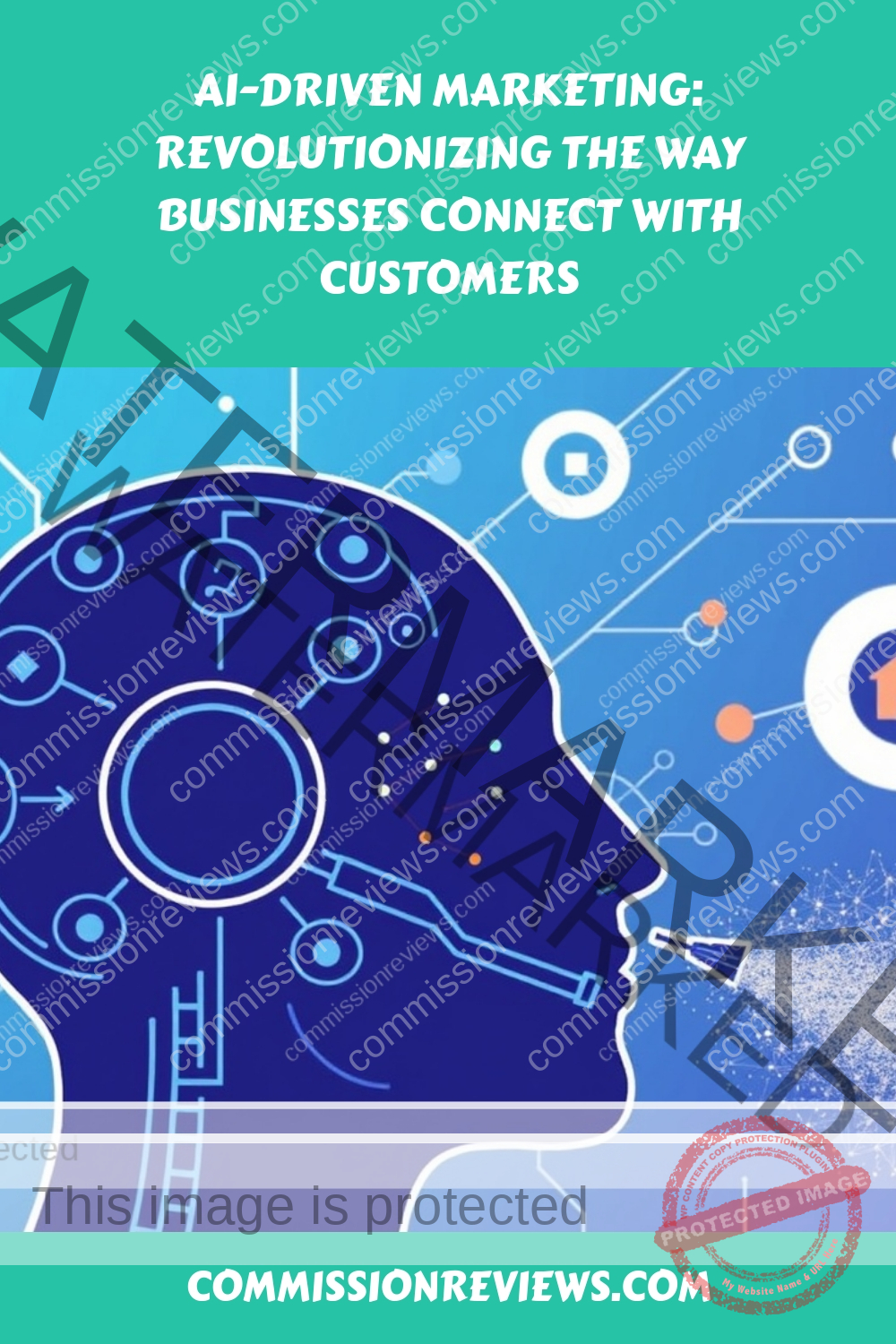In recent years, the integration of artificial intelligence (AI) in marketing has transformed the way businesses connect with their customers. AI-driven marketing involves the use of advanced technologies to analyze consumer behavior, predict trends, and personalize marketing strategies. This has enabled businesses to create more targeted and effective campaigns, resulting in improved customer engagement and higher conversion rates.
One of the key drivers behind the rise of AI-driven marketing is the vast amount of data available to businesses. With the proliferation of digital channels and the increasing use of connected devices, companies have access to unprecedented amounts of customer data. AI technologies can process and analyze this data at a scale and speed that would be impossible for humans, providing valuable insights into consumer preferences and behavior.
As a result, businesses can tailor their marketing efforts to individual customers, delivering personalized experiences that resonate with their target audience.
Key Takeaways
- AI-driven marketing is revolutionizing the way businesses connect with customers by leveraging artificial intelligence to enhance customer interactions and personalization.
- The impact of AI on marketing has evolved customer engagement, providing potential for enhanced customer insights and targeting.
- Businesses are embracing data-driven decision making to leverage AI for marketing success, revolutionizing customer relationship management and engagement.
- However, ethical and privacy considerations pose challenges in AI-driven marketing, requiring businesses to navigate these concerns.
- The future of AI in marketing holds potential for further revolutionizing customer insights and targeting, as businesses continue to embrace AI-powered marketing strategies.
Understanding the Impact of AI on Marketing: A Look at the Evolution of Customer Engagement
From Generalized to Personalized
AI has made it possible for businesses to move away from generic marketing strategies and instead, focus on tailoring their approach to each individual customer. This is achieved by analyzing vast amounts of customer data, including browsing history, purchase patterns, and other online behaviors. As a result, businesses can create highly targeted and relevant marketing messages that resonate with their audience.
Real-Time Interactions and Dynamic Content Delivery
AI has also revolutionized customer engagement by enabling real-time interactions and dynamic content delivery. Through machine learning algorithms, businesses can analyze customer behavior in real-time and adjust their marketing messages accordingly. For instance, an e-commerce website can use AI to recommend products to customers based on their browsing history and purchase patterns, creating a more personalized and relevant shopping experience.
A New Era of Dynamic Engagement
This level of dynamic engagement was previously unattainable without the capabilities of AI. With AI, businesses can now respond to customer needs in real-time, creating a more immersive and interactive experience. As AI continues to evolve, we can expect to see even more innovative applications of this technology in the world of marketing.
AI-Powered Marketing Strategies: Enhancing Customer Interactions and Personalization
AI-powered marketing strategies have redefined customer interactions by enabling businesses to deliver highly personalized experiences at scale. By leveraging AI technologies such as natural language processing and predictive analytics, companies can understand customer preferences and intent more accurately, leading to more relevant and targeted communication. For instance, chatbots powered by AI can engage with customers in real time, providing personalized recommendations and assistance based on individual queries.
These interactions not only enhance the customer experience but also contribute to building brand loyalty and trust. Additionally, AI-driven personalization extends to email marketing, where algorithms can analyze customer behavior to deliver tailored content and product recommendations, increasing the likelihood of conversion. For more information on AI-driven marketing strategy, visit Columbia Business School’s AI-Driven Marketing Strategy Program.
The Future of AI in Marketing: Exploring the Potential for Enhanced Customer Insights and Targeting
| Metrics | Current Status | Potential |
|---|---|---|
| Customer Insights | Partially Enhanced | High Potential for Enhancement |
| Targeting Accuracy | Moderate | Significant Potential for Improvement |
| Personalization | Basic | Opportunity for Advanced Personalization |
| Automation | Partial Automation | High Potential for Full Automation |
The future of AI in marketing holds immense potential for further enhancing customer insights and targeting. As AI technologies continue to advance, businesses will be able to gain deeper understanding of consumer behavior and preferences, leading to more accurate predictions and targeted marketing efforts. One area of future development is the use of AI for predictive analytics, where machine learning algorithms can anticipate customer needs and behaviors with greater precision.
This will enable businesses to proactively engage with customers at the right moment with the right message, maximizing the impact of their marketing efforts. Moreover, AI-driven targeting will become more granular, allowing businesses to identify niche segments within their audience and tailor specific campaigns to address their unique needs and interests.
Leveraging AI for Marketing Success: How Businesses are Embracing Data-Driven Decision Making

Businesses are increasingly leveraging AI for marketing success by embracing data-driven decision making. AI enables companies to analyze vast amounts of data to uncover actionable insights that inform their marketing strategies. By leveraging machine learning algorithms, businesses can identify patterns and trends within their customer data that would be impossible to discern through traditional analysis methods.
Furthermore, AI empowers businesses to make real-time decisions based on up-to-date information, allowing for agile and responsive marketing strategies. For example, AI-powered tools can monitor social media conversations and sentiment analysis in real time, enabling businesses to adjust their messaging or campaigns based on current trends or public sentiment. This data-driven approach not only enhances the effectiveness of marketing efforts but also enables businesses to stay ahead of the competition in a rapidly evolving market landscape.
AI-Driven Marketing Tools: Revolutionizing Customer Relationship Management and Engagement
Enhanced Customer Insights
CRM platforms powered by AI can analyze customer interactions across various touchpoints, providing a holistic view of each customer’s journey and preferences. This enables businesses to deliver more personalized and targeted communication, fostering stronger relationships with their audience.
Streamlined Sales Process
Moreover, AI-driven tools have automated many aspects of customer engagement, such as lead scoring and predictive analytics, allowing businesses to prioritize their efforts on high-value opportunities. For instance, AI can analyze historical sales data to identify patterns that indicate a high likelihood of conversion, enabling sales teams to focus their efforts on leads with the greatest potential.
Improved Customer Experience
This not only streamlines the sales process but also improves the overall customer experience by delivering relevant and timely communication.
Overcoming Challenges in AI-Driven Marketing: Navigating the Ethical and Privacy Considerations
While AI-driven marketing offers significant benefits, businesses must navigate ethical and privacy considerations to ensure responsible use of these technologies. One of the primary challenges is maintaining transparency and trust with customers regarding the use of AI in marketing. Customers may be concerned about how their data is being used and whether AI-powered systems are making fair and unbiased decisions.
To address these concerns, businesses must prioritize transparency in their data collection and usage practices, providing clear information about how customer data is being utilized to personalize marketing efforts. Additionally, implementing ethical guidelines for AI usage in marketing can help mitigate potential biases and ensure that algorithms are making decisions that align with ethical standards. Furthermore, businesses must prioritize data security and privacy protection when leveraging AI for marketing purposes.
This includes implementing robust data protection measures and complying with relevant regulations such as GDPR or CCPA to safeguard customer information. By proactively addressing these ethical and privacy considerations, businesses can build trust with their customers and ensure that AI-driven marketing efforts are conducted responsibly. In conclusion, AI-driven marketing has revolutionized the way businesses connect with customers by enabling personalized experiences, data-driven decision making, and enhanced customer insights.
As AI technologies continue to advance, businesses have the opportunity to further refine their marketing strategies and deliver even more targeted and impactful campaigns. However, it is essential for businesses to navigate ethical considerations and prioritize transparency and privacy protection to ensure responsible use of AI in marketing. By leveraging AI effectively while addressing these challenges, businesses can unlock the full potential of AI-driven marketing to drive customer engagement and business success.
FAQs
What is AI-driven marketing?
AI-driven marketing refers to the use of artificial intelligence technologies, such as machine learning and natural language processing, to analyze data, automate tasks, and personalize customer experiences in marketing efforts. It allows businesses to gain deeper insights into customer behavior, optimize marketing strategies, and enhance customer engagement.
How are businesses leveraging AI in marketing?
Businesses are leveraging AI in marketing by using it to analyze large volumes of data to identify patterns and trends, automate repetitive tasks such as email marketing and customer service, personalize content and recommendations for individual customers, and optimize advertising and targeting strategies.
What impact does AI have on marketing and customer engagement?
AI has a significant impact on marketing and customer engagement by enabling businesses to deliver more personalized and relevant experiences to their customers, improving the efficiency and effectiveness of marketing campaigns, and providing deeper insights into customer behavior and preferences.
What are some AI-powered marketing strategies?
Some AI-powered marketing strategies include predictive analytics for customer behavior, personalized recommendations based on customer data, automated chatbots for customer service, and dynamic pricing based on demand and customer behavior.
What is the future potential of AI in marketing?
The future potential of AI in marketing includes enhanced customer insights and targeting, more advanced personalization and automation of marketing efforts, improved customer relationship management, and the ability to adapt marketing strategies in real-time based on AI analysis.
How are businesses using AI for marketing success?
Businesses are using AI for marketing success by embracing data-driven decision making, leveraging AI-powered tools for customer relationship management and engagement, and implementing AI-driven strategies for personalized and targeted marketing campaigns.
What are some challenges in AI-driven marketing?
Some challenges in AI-driven marketing include navigating ethical considerations around data privacy and security, ensuring transparency and fairness in AI algorithms, and addressing concerns about the potential impact of AI on jobs and human creativity in marketing.
















